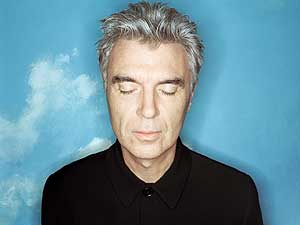|
Audio
Photos
Resources
Your Voice
|
Never the same as he ever was
June 16, 2004
As an artist and musician, David Byrne has never been satisfied with resting on laurels. Whether as leader of the groundbreaking rock group 'The Talking Heads,' or world music enthusiast, or as a filmmaker and visual artist, Byrne's goal is to take art in new directions. Byrne is the headline performer at the Walker Art Center's annual "Rock the Garden" street party Friday night.
Minneapolis, Minn. — Nearly every David Bryne creation contains some quality that sets it apart from his previous work. On his new CD, "Grown Backwards," the wrench Bryne deliberately threw into his artistic process was to embrace a songwriting style he had rebelled against in the past. On almost all the songs, the melody came first. The arrangements, the chords, the rhythm and finally the lyrics he says, became subservient to the melody.
|
They do lead you places that you wouldn't go to if you were just strumming a guitar. You kind of fall into certain harmonic and chordal patterns if you're strumming a guitar for instance, and if you just freely singing a melody you don't always fall into those patterns. You sometimes take some surprising detours.
- David Byrne on how be began compositions for his new CD by humming into a microcassette |
"Which to me is kind of traditional, western, almost classical music kind of structure," he says, "which in general I've tried to stay away from, just because of everything, all the baggage that it carries with it."
Normally, Byrne would start out with improvised textures and rhythms, throw in some words perhaps, then add the tune later. This time he began by humming melodies into a micro-cassette recorder, which he says led to some happy surprises.
"They do lead you places that you wouldn't go to if you were just strumming a guitar," he says. "You kind of fall into certain harmonic and chordal patterns if you're strumming a guitar for instance, and if you just freely singing a melody you don't always fall into those patterns. You sometimes take some surprising detours."
Bryne's infatuation with Brazilian music remains evident on the new CD, with some added twists. He's joined on many of the songs by the Austin, Texas-based chamber music ensemble, the Tosca Strings. You would think violins, viola and cello would have trouble competing with a very percussive back-up band, but Bryne says they compliment each other nicely. He says there's room for strings in the mix because his band contains only one guitarist and no keyboards.
In addition to 11 original songs, 'Grown Backwards' also features Bryne singing two opera arias, one from Verdi's La Traviata, the other from Bizet's The Pearl Fishers. He performs the latter with Rufus Wainwright. Bryne says the arias ended up inspiring him as a songwriter.
I thought they were just beautiful songs," he says. "And I thought I could maybe approach them just as songs. I think probably emotionally they were kind of key for me. They kind of opened things up and allowed other things I was writing of my own to happen. And they kind of opened up a kind of sonic possibilities even though I didn't write a lot of other stuff like that. And I think they kind of did that. They kind of opened up a door and let some of the other stuff in."
Few have done more than David Byrne in terms of introducing Americans to the sonic pleasures of world music. The record company he founded, Luaka Bop, is often credited as being one of the most influential world music labels around. Byrne says he has mixed feelings about the interest Americans have in world music, but he says there's reason to be optimistic.
"Some of that music has made sort of inroads where certain acts have kind of established themselves on their own terms, and not just as background music that sounds tropical or something like that," he says. "I just did a Carnegie Hall show with Caetano Veloso, that he invited me to join him, and he's, I would think, pretty much established by now, as much a viable artist in the United States as any kind of pop or rock act you could name. That to me, that's something. That would have been hard for me to imagine ten years ago. But, there's a lot less of it than let's say there is in Europe. In Europe, things are a lot more mixed up which I think is really healthy."
Throughout his career and especially since 9/11, David Bryne, a New York city resident, has been politically involved, but more as a citizen than an artist. He's a vocal opponent of the war in Iraq for example. Bryne acknowledges the oblique political undercurrents which sometimes run through his work, but he says other artists are better at being overtly political than he is.
"I tend to deal with that in other ways," he says. "I've taken out ads with other musicians in the New York Times and Rolling Stone and I've done posters for the streets and all that kind of stuff and for me that's a more effective and more immediate way of dealing with specific issues, political issues, than a song. What I can do best as an artist is almost to propose an alternative. Not an idealized utopia but just, almost just the fact of existing as an alternative to all the crap that's out there."
David Bryne and his musical cohorts the Tosca Strings will rock the Sculpture Garden in Minneapolis this Friday night. The evening will also include the multi-culti funk of the Antibalas Afrobeat Orchestra and singer songwriter and former Minneapolitan Barb Cohen.
|
News Headlines
|
Related Subjects
|

